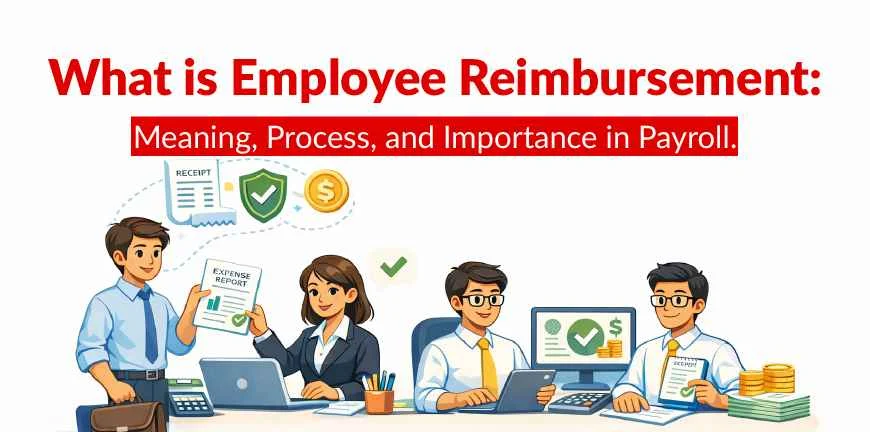
Understanding Generation Z Employees in the Workplace
12/09/2025
What is Mass Hiring? Process, Challenges & Best Practices
15/09/2025What is the biggest motivator for employees to work for an organisation? The paychecks they receive at the end of the month. Every employee, regardless of the great culture, inclusivity, career development opportunities, and other benefits presented in an organisation, expects to be paid on time and accurately.
A payroll manager is the one who makes sure this task is carried out correctly. Not only are they responsible for ensuring that all employees receive their salaries on time, but they also maintain compliance with all relevant regulations and requirements. A professional in this role must possess precise, cool, and accurate skills, as they are responsible for handling the most critical task of the organisation.
What is a Payroll Manager?
A payroll manager is a professional responsible for making sure the entire payroll process is carried out smoothly within an organisation. They must make sure that the payroll procedures that are being carried out comply with all relevant tax laws and obligations. They are also to supervise and direct the payroll team and make sure to maintain proper payroll records.
Key Duties & Responsibilities of a Payroll Manager
A payroll manager processes payroll with zero errors. They must ensure employees are paid on time, with proper withholding of taxes and other deductions. Payroll managers are also called payroll specialists, supervisors, and accounting managers.
Some of the key duties of a payroll manager are-
- Must take care of the accurate processing of payroll, meaning proper calculation of salaries with the correct deductions and benefits administration.
- Payroll reports must be prepared, including the filing of income tax returns as well as PF filing.
- Carrying out regular payroll audits to ensure all payroll processes and procedures are proper and follow laws and regulations.
- Make sure that the HR and finance departments add all employee data into the payroll system
- When the company hires someone new, or if someone gets terminated or promoted, it is the manager’s duty to make sure that information is fed to the payroll system to avoid discrepancies.
Key payroll manager responsibilities include:
- Making sure that the entire payroll processing is being carried out aptly, which includes the calculation of salaries, deductions and benefits.
- He must ensure that the correct payroll data is being fed to the system to avoid payroll errors and discrepancies.
- Payroll systems must be monitored and maintained correctly to ensure protection of sensitive, confidential employee data. The payroll system must be upgraded from time to time as required.
- A payroll manager must generate reports that have information about all tax filings, like income tax returns, PF filings, and benefit deductions, all of which comply with regulatory requirements.
- If an employee has any concerns related to their payroll, it’s the payroll manager’s job to address these issues.
- A payroll manager must stay on top of data security measures and implement the same to secure data.
- They must keep themselves updated on the changing tax laws and regulations and implement these changes to ensure best practices and compliant standards.
Skills & Qualifications Required for a Payroll Manager
A payroll manager is expected to be well-versed in all things payroll. Some of the key skills and qualifications required for a payroll manager include-
- An accounting degree or a degree in finance or human resources is necessary.
- A previous employment where they have had experience in managing payroll or accounts.
- Complete understanding of how the payroll process works, and the relevant labour laws, taxation and statutory compliance associated with payroll.
- A payroll manager will know how to conduct payroll audits and regular inspections to assess if the payroll processes and procedures are right.
- Have proper proficiency in various payroll software and systems, such as SAP and/or ADP and a knowledge of implementing and managing the same.
- A good understanding of financial principles and the ability to reconcile payroll with financial records.
- Management of time, ensuring payroll processing is done in time, as well as managing payroll-related activities.
- A payroll manager must keep themselves updated about all the payroll data that is entered into the system, and to ensure everything is updated, they must communicate with the HR and finance teams.
- Knowing how to use Microsoft Office applications and Excel is a must.
- Certifications like Certified Payroll Professional (CPP) can help your profile stand out
- Must understand how tax laws and regulations work and how to implement them while processing payroll. This includes TDS, GST and income tax provisions.
- Know-how of payroll-related aspects of Indian labour laws like the Employee Provident Fund (EPF)Act, Employees’ State Insurance (ESI)Act and Professional Tax (PT) Act.
- To ensure proper integration of payroll data into payroll systems, a payroll manager must know about HRIS (Human Resources Information Systems) and time and attendance systems.
- Know-how about various accounting principles and payroll-related practices can make them stand out.
What are the Challenges Faced by Payroll Managers?
Payroll processing requires precision and accuracy. Of course, with automation taking over most of the payroll tasks, the scope for errors is far lesser than compared to previous times. However, there are still a few challenges involved-
1. Legal Compliance and statutory challenges
Keeping up with changing labour laws and regulations can be tough. This includes employment laws such as PF, ESI, etc. Failing to do so can result in penalties, risks and audit issues.
2. Payroll errors and miscalculations
Often, mistakes can occur while calculating salaries, especially when deductions are involved. It can result in either overpayments or underpayments, resulting in non-compliance.
3. Management of different categories of employees
Organisations may have employees working on a contractual, permanent, or part-time basis and may have different pay structures, benefits, and other arrangements. This can sometimes become complex during payroll processing.
4. Data security and confidentiality
Payroll data involves information such as bank details, personal data and salaries. Making sure this data is protected against breaches and unauthorised access is crucial.
5. Scaling of payroll based on company growth.
As organisations grow or expand, payroll managers may have to scale operations to accommodate the addition of employees, operations in different locations, and dealing with other currencies.
6. Timely payments and employee trust
Making sure salaries are disbursed on time to employees is essential. Failing to do so, due to errors in payroll processing, not only results in mistakes but also dents employee trust and leads to dissatisfaction.
7. Integration with HR and financial systems
All employee payroll data, including that of the HR and finance teams, must be integrated into the payroll system to ensure zero discrepancies. But this can be hindered if there are incompatible systems and poor communication.
What are the Best Practices for Payroll Managers?
To ensure effective payroll management, there are a few best practices that payroll managers must implement in 2025.
1. Standardisation of payroll workflows
Implementation of proper, consistent and documented workflows across various departments and locations to reduce errors and streamline approvals.
2. Transparent process and enhanced employee access
By using payroll systems that offers employee self-service portals allows employees access to payroll data and other updates, increasing employee trust and easier error detection.
3. Automated payroll processing
By utilising the right payroll software, all payroll calculations must be automated, and tax filings should be made easier, ensuring better accuracy and efficiency.
4. Frequent conduction of payroll audits
Payroll audits must be conducted frequently to ensure there are no flaws or discrepancies in the payroll procedures that are being implemented.
5. Integration of payroll with HR and Finance systems
Integrating payroll with HR and financing systems ensures ease of data flow and proper reporting across all teams from all related departments.
6. Compliance maintenance
Keeping yourself updated with the changing labour laws and regulations can help avoid non-compliance that otherwise leads to hefty fines.
7. Data security
Important payroll data must be protected and secured with robust security measures, such as encryption and other access controls.
8. Employee self-service portals
Implementation of employee self-service portals can allow employees to access their payroll information, download payslips, etc, reducing the burden on the HR team as well as increasing employee satisfaction.
9. Optimisation of payroll scheduling
Make sure that your payroll cycles coincide with tax deadlines and process payroll at the same time to ensure on-time payments to employees. This also reduces the administrative burden on the payroll team.
10. Invest in training and development.
As a payroll manager, you must make sure your team keeps itself informed about software updates, tax laws and best practices through training programs.
Conclusion
A payroll manager is someone who understands all the nuances involved in payroll and has the knowledge and expertise to process it with precision. They are well versed in complex labour laws, compliance regulations and make sure to factor it all in while processing payroll. A good payroll manager not only ensures peace of mind for organisations but also makes sure all the payroll procedures are in line with tax laws and standards, steering clear of penalties or legal issues.
Frequently Asked Questions
1. What is the role of a payroll manager?
A payroll manager is a professional responsible for making sure the entire payroll process is carried out smoothly within an organisation. They must make sure that the payroll procedures that are being carried out comply with all relevant tax laws and obligations.
2. What qualifications are required for a payroll manager?
To become a Payroll Administrator, you generally need to have a 2 to 5-year degree in management, accounting, human resources or employment law. The following courses are particularly popular: BTS Accounting and Management.
3. How much does a payroll manager earn in India?
On average, Payroll Manager salaries range from ₹6.6 Lakhs to ₹30.0 Lakhs per year.
4. What software do payroll managers use?
Payroll managers use specialised software, such as HR management systems (HRMS) or dedicated payroll platforms, to automate salary calculations, tax compliance, direct deposits, and other HR tasks. Popular options include RazorpayX Payroll, GreytHR, Zoho, and sumHR.
5. How does a payroll manager ensure compliance with labour laws?
A payroll manager ensures labour law compliance by identifying applicable laws, maintaining accurate records, conducting regular audits, utilizing payroll software, staying updated on legal changes, training staff, and implementing clear policies to safeguard against penalties and foster a positive work environment.
Contact Us For Business Enquiry

Yugandhara V. M
Yugandhara V. M serves as the Assistant Vice President – HRO at Alp Consulting Ltd., bringing over 14 years of rich experience in Human Resource Outsourcing, payroll management, and statutory compliance. He specializes in driving process excellence across HR operations, ensuring seamless service delivery and compliance with labor laws. Yugandhara’s expertise lies in managing large-scale client engagements, optimizing HR processes, and implementing efficient workforce management systems that enhance organizational performance. He also leads comprehensive payroll services, ensuring accuracy, timeliness, and compliance for diverse client portfolios.




